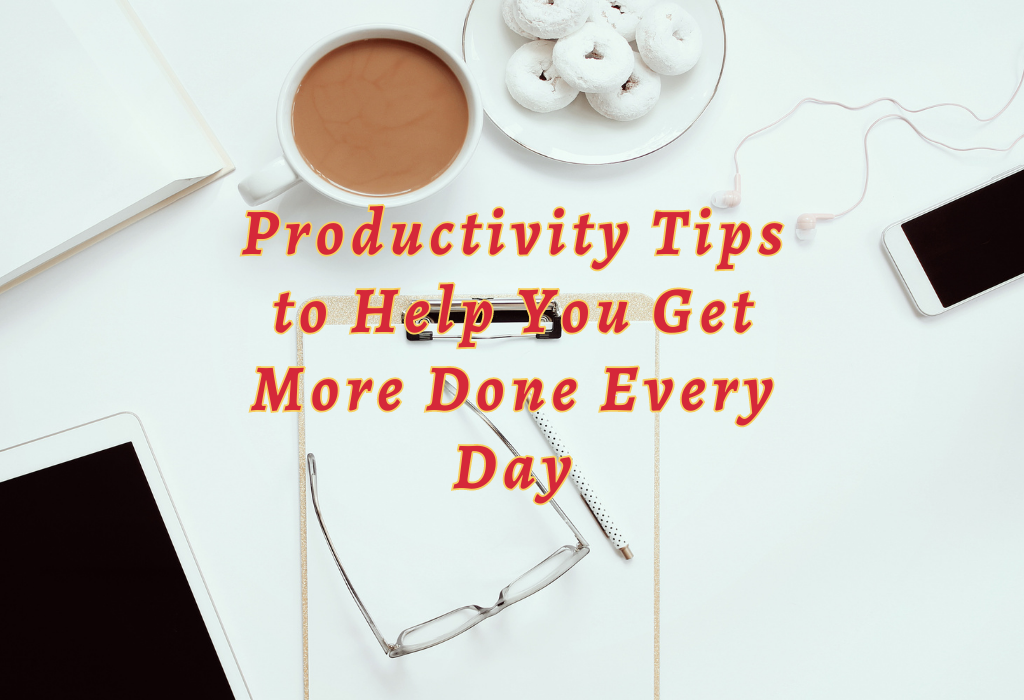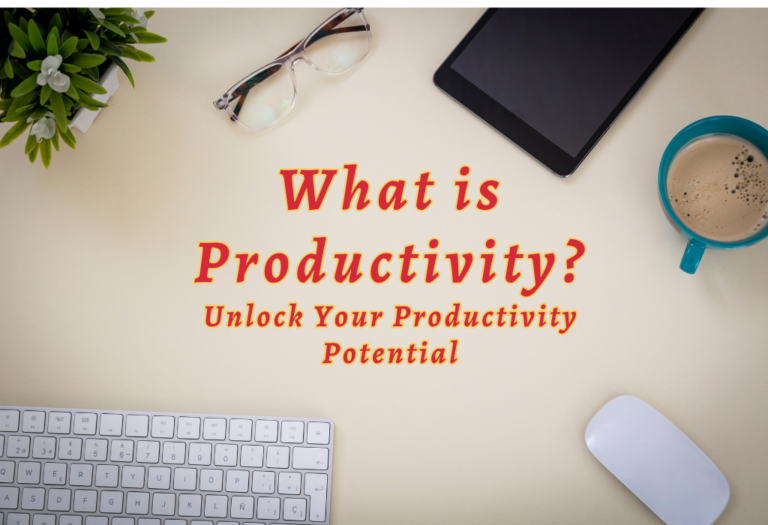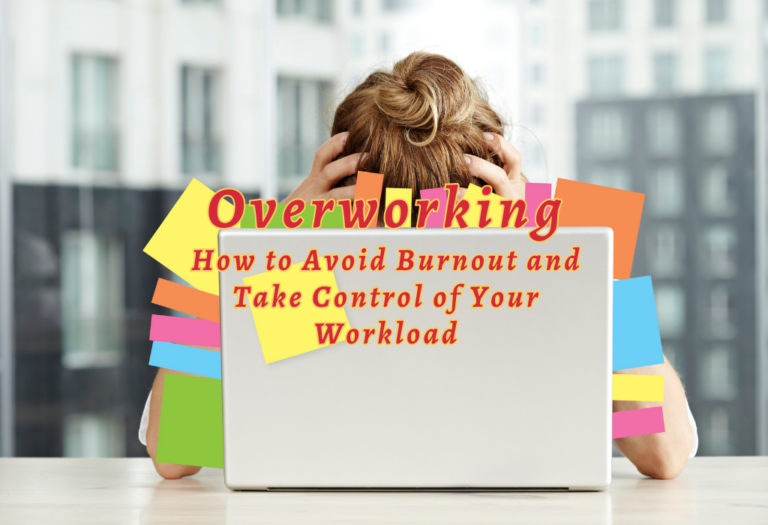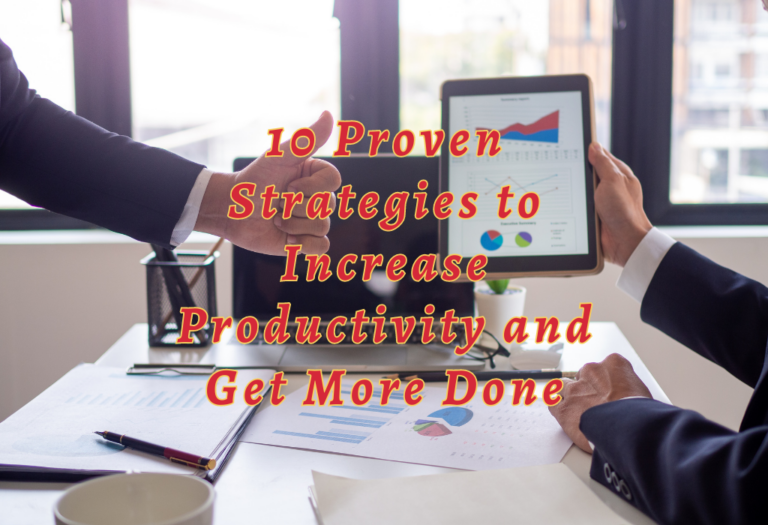Productivity Tips to Help You Get More Done Every Day
So you’ve read about productivity tips, and it all looks good on paper, but if you need more time or motivation to make them work, how will you ever get more done? It’s a question that’s been plaguing ambitious people since the beginning of time. It’s enough to make some of us feel like we’ve been banging our heads against the wall – it just can’t be done.
Well, we’ve got news for those of us who are feeling productive paralysis – there are ways to increase your productivity and get more done every day – and it’s not as complicated as you think! We’ve put together 10 Productivity Tips to Help You Get More Done Every Day, which you can use to become the workhorse of your dreams.

What is Productivity?
Productivity measures how efficiently and effectively a person or organization completes tasks. It’s an essential concept for businesses, entrepreneurs, and individuals alike as it helps to maximize resources while achieving goals in the most efficient way possible.
Productivity can be measured in various ways depending on the task at hand. For example, factors such as output per hour worked or cost savings may be considered when measuring productivity within a business context.
Factors such as time management skills and goal completion rates may be considered when measuring personal productivity.
Toxic productivity is an unhealthy approach to work and life that can lead to burnout, anxiety, depression, and other physical or mental health issues. It involves pushing yourself too hard for too long without taking the necessary breaks or time off to rest and recharge.
This type of productivity often results in a lack of balance between your personal and professional lives and an inability to prioritize tasks effectively.
How to Create an Effective System?
Developing an effective system is vital for production efficiency. A successful system generates a plan of action with distinct objectives and deadlines that assist in defining and managing tasks. Assessing what procedures are required to complete tasks, understanding how those processes might be arranged, and determining which daily tasks are essential and how to prioritize them are needed to develop an effective system.
To design an effective system, it is essential to take a bird’s-eye view of the larger mission, comprehend the process required to complete it, and then divide that process into smaller objectives. This will give you a clearer sense of direction and measurable objectives that you can check off as you go. Create realistic and attainable goals when drawing out your action plan, so you feel safe and satisfied. Smaller, more achievable goals might be significantly more motivating than enormous, more daunting, or impossible-to-accomplish ambitions.
However, it is also essential to remember that while having procedures in place might boost your efficiency, they should not be overly rigid and rigidly adhered to. Some days will go differently than planned, and random assignments may arise. When this occurs, give yourself the flexibility to change your goals if necessary; don’t become caught on one goal or job if others are more important or urgent.
Developing an efficient method is essential to accomplishing more daily, but remember to prioritize the most important activities. Next, we will examine how to prioritize your projects so that, regardless of how much work needs to be performed, you can break it down into tiny, attainable steps to help you achieve your larger goals.
It is essential to build effective methods for production efficiency. A successful system should include distinct objectives and deadlines, controlled processes, and the proper assignment of priority to activities. Assess the processes required to complete the entire assignment, then break them down into manageable objectives that will not overwhelm you. Remember to be adaptable when plans change and set appropriate priorities to accomplish broader goals.
Tips for Being Productive at Work
Even though productivity is vital in all sectors where results are necessary or when people want to attain their goals, it is likely regarded as most significant in the workplace.
In recent years, as the modern workplace has evolved and changed to mixtures of in-person, remote, and hybrid work, the typical 9-to-5 workday has given way to more flexible work hours. Some of these changes have prompted individuals to work more efficiently. Still, for others, these new dynamics provide obstacles to productivity, both for the employee and the employer, who must develop new methods for assessing efficiency and encouraging the staff.
Regardless of your sector, making a few easy tweaks to your weekday routine can significantly increase your productivity. We’ve outlined some of these modifications below.
Conclusion and Overall Productivity Tips
Increasing productivity is essential for achieving success in any profession. It’s also a great way to remain organized and help yourself manage your time more effectively. By making simple changes to your daily routine, you can make strides toward becoming more productive no matter who you are or what field you work in.
The tips presented here are tried-and-true strategies that have been used by successful professionals, entrepreneurs, and even students alike. Whether using technology to your advantage, finding a good working environment, or exercising mindfulness techniques, productivity can come from all angles of life – not just from hard work. Finding a balance between rest and work is key – remember that it’s essential to stay healthy and energized despite the demands of daily tasks.
These tips serve as guidelines for increasing overall productivity. Every person has different needs and approaches to work, so feel free to experiment with other methods until you find what works best for you!
Overall, productivity can come in many forms – staying focused on the task at hand, investing in the right tools and technology, adopting systems that increase efficiency, and taking breaks when needed — all of these small changes can add up to making a massive difference in terms of one’s ability to perform optimally. Strategizing and implementing productivity techniques requires motivation, dedication, and allocating enough time for self-care. With this combination in mind, everyone has the potential for more extraordinary accomplishments throughout their day.
Answers to Frequently Asked Questions
Final Thoughts
Finally, having a sound productivity system can also be very beneficial. This includes setting up an effective organizational design, creating a daily checklist, establishing efficient communication tools, and developing clear project plans. These systems provide structure and guidance, which leads to greater productivity in the long run.






